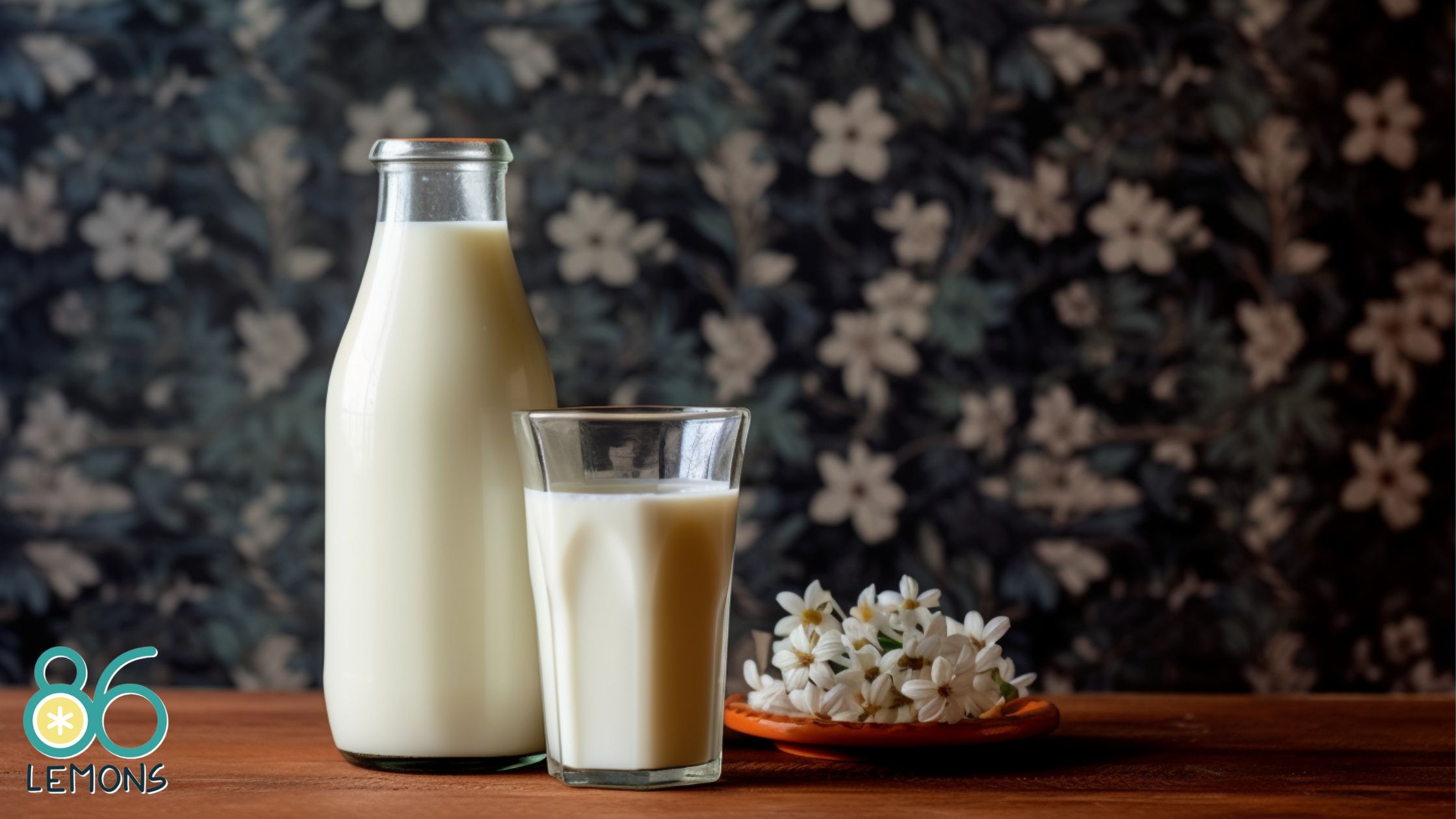Embracing a vegan lifestyle or managing lactose intolerance brings the challenge of finding suitable substitutes for milk. Fortunately, the market is vibrant with a variety of plant-based milk alternatives that not only cater to dietary restrictions but also contribute to a more sustainable food system.
Whether you’re after a creamy texture for your morning coffee or a nutritious liquid for vegan baking, vegan substitutes for milk offer diverse flavors and nutritional profiles to match your preferences.
Transitioning to vegan milk options also supports health-conscious choices, providing you with products often enriched with essential vitamins and minerals. As you explore the culinary uses of these vegan milk varieties, you’ll discover that they adapt seamlessly to numerous recipes, from smoothies to baked goods.
Each vegan milk type has unique properties, making it essential to consider your taste and cooking needs when making a selection.
Key Takeaways
- Plant-based milk alternatives cater to vegan diets and those with lactose intolerance.
- Vegan milk substitutes are versatile for use in a wide range of culinary applications.
- Choosing vegan milk can be a step towards healthier and more sustainable consumption.
Exploring Plant-Based Milk Varieties
You’re in for a delicious and nutritious journey as we dive into the world of plant-based milk alternatives! These vegan-friendly options are not just good for the environment, but they’re also packed with a variety of essential nutrients like calcium, vitamin D, protein, fiber, omega-3 fatty acids, and a slew of antioxidants and minerals.
Nut Milk
Almond milk: You’ll find that almond milk is a staple in vegan diets, favored for its light texture and nutty flavor. It’s a source of vitamin E and is usually fortified with calcium and vitamin D.
Cashew milk: Creamy and rich, cashew milk is a delicious choice with less fiber than other nut milk but still offers protein and iron.
Hazelnut milk: Hazelnut milk provides a distinctively sweet and robust taste along with vitamin E, often enhanced with additional calcium.
Macadamia nut: This milk stands out with more fat content, meaning you get that delectable creaminess along with a dose of healthy, monounsaturated fats.
Grain and Seed Milk
Oat milk: Known for its naturally creamy texture, oat milk is high in fiber and iron, giving you that energy boost you need for the day.
Rice milk: A hypoallergenic option, rice milk is light and refreshing. It’s fortified to give you a boost of calcium and vitamin D.
Hemp milk: Get your omega-3s with hemp milk! This nutty-tasting milk is also a great way to infuse your diet with those essential fatty acids.
Flax milk: Low in calories but high in omega-3s, flax milk is a wise pick if you’re watching your caloric intake and wanting to up your nutrient game.
Other Vegan Milk Alternatives
Coconut milk: With its tropical flair, coconut milk not only enriches your palate but also injects iron and healthy fats into your diet.
Soy milk: A powerhouse of protein, soy milk mirrors cow’s milk most closely in terms of protein content while providing antioxidants, calcium, and vitamin D.
Vegan buttermilk: For your baking needs, vegan buttermilk, which can be made using any plant-based milk, helps create those fluffy textures in your pastries with the added benefits of the original milk’s nutrients.
Culinary Uses for Vegan Substitutes for Milk
Vegan milk substitutes open up a world of culinary possibilities, allowing you to explore exciting flavors and textures in the kitchen. Whether you’re stirring up decadent desserts or creating creamy sauces, plant-based milk provides a fantastic array of options tailored for any recipe.
Baking and Desserts
When you’re baking your favorite treats, vegan milks are a game-changer. You can use almond milk as a direct replacement for buttermilk in cakes, scones, or muffins, introducing a rich texture without compromising on nutritional value. In search of something cool and creamy?
Go ahead and whip up some banana ice cream, using your choice of vegan milk for an indulgent yet guilt-free dessert. Vegan butter substitutes and various nut butter can also step in for traditional butter, bringing both creaminess and a punch of flavor to your chocolate or vanilla creations.
- Chocolate cake recipe: Replace dairy milk with unsweetened cocoa powder and your favorite vegan milk.
- Vanilla cupcakes: Use a blend of vegan milk and vanilla extract for a soft, moist crumb.
Savory Cooking
In savory dishes, vegan milk substitutes shine in their versatility. You can create rich, creamy sauces without dairy by using unsweetened plant-based milk. They blend perfectly into everything from Alfredo to béchamel.
Vegan cheese derived from plant milk can add a cheesy zest to your pasta or pizza, while vegan yogurt or sour cream can be used to add tanginess to dishes like Indian curries or nachos.
- Creamy sauces: Opt for vegan butter and unsweetened vegan milk.
- Cheese sauces: Blend vegan cheese with your chosen vegan milk for smoothness.
Beverages and Smoothies
Boost your mornings with a cup of coffee enriched with vegan milk; it’s perfect for making lattes or when you just want a splash of creaminess in your brew. If you’re blending up a smoothie, play with different flavors by adding sweetened or unsweetened vegan milk.
- Coffee options:
- Lattes: Froth up the milk for a velvety finish.
- Regular brew: A splash of unsweetened vegan milk adds mild flavor and creaminess.
- Smoothie ideas:
- Fruity: Combine vegan milk with your choice of berries and banana.
- Protein-packed: Add a scoop of your favorite protein powder to vegan milk and blend.
Health and Nutrition Considerations
Exploring dairy-free milk substitutes opens up a world of nutritional benefits and options tailored to your health goals. Let’s dive into what makes these plant-based alternatives a smart choice for your body and diet.
Benefits of Dairy-Free Alternatives
You have a lot to gain from incorporating dairy-free milk into your life. For starters, you can wave goodbye to the saturated fats typically found in cow’s milk, which is great news for your cholesterol levels. Plus, with zero cholesterol in plant-based milk, you’re actively supporting your heart health with every sip.
If you’re keen on weight loss or managing your calorie intake, these substitutes often come in lower in calories compared to their dairy counterparts.
Another exciting benefit is the potential relief from digestive issues. You’re saying so long to lactose, which means no more discomfort for those with sensitivities or intolerances. Embrace the plant power!
Nutritional Profiles and Fortification
Plant-based milks come in a variety of nutritional profiles that cater to your needs. Here’s a neat breakdown to help you understand your options:
- Soy Milk: A powerhouse with protein content comparable to cow’s milk and often fortified with calcium and vitamins.
- Almond Milk: Lower in protein and calories but typically enriched to provide essential nutrients.
- Oat Milk: Gloriously rich in fiber with a creamy texture that’s hard to resist.
Fortification is key; manufacturers pump these milks full of nutrients that plant-based sources might lack naturally. This means you often get your necessary dose of calcium, vitamin D, and B12 – crucial for bone health and energy.
DIY Vegan Milk and Sustainability
Creating your own vegan milk at home can empower you with sustainability while delighting in the rich, creamy goodness of plant-based alternatives. Dive into the world of homemade plant milks that are not only environmentally friendly but also customizable to your taste preference!
Homemade Plant Milk Recipes
Seeds, Grains, Nuts, and Beans: These are the humble beginnings of your DIY vegan milk journey. With just a blender, you can whip up almond, soy, or rice milk. Start with soaking your almonds or beans overnight. Then, blend them with water, strain the mixture, and voilà – you have your milk base.
- For a creamier texture, add a spoonful of coconut oil.
- Enhance flavor with a dash of maple syrup or the sweetness of your choice.
- Customize with a sprinkle of nutritional yeast for a cheese-like zest.
Remember, a little ingredient goes a long way – experiment to find your perfect recipe!
Environmental Impact and Choices
Your decision to craft homemade vegan milk is a step towards reducing your carbon footprint. Choosing almonds or oats over dairy can significantly lower the resources used, such as land and water.
Sustainable Choices:
- Opt for local nuts and grains to minimize transportation emissions.
- Reuse the pulp from nuts and seeds in baking or as compost to ensure zero waste.
By being environmentally conscious and selecting sustainable ingredients for your homemade milk, you’re contributing to a more eco-friendly planet and promoting a plant-based diet. Let’s raise a glass of homemade vegan milk to good health and an even better environment!


